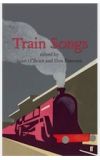
02 Nov 2013 17:44:16
British poetry has always been a network of overstretched intercity routes and quaintly mouldering branch lines. Wordsworth scowls at Lake District tourists in a late sonnet, Tony Harrison changes at York and Philip Larkin hopes the American academics contemplating the departures board in King's Cross "go to Newcastle and bother Basil Bunting instead". Speaking of Larkin, consider the following lines:
Crematoria, multiplex
way stations in the form of bigsheds
that house their promises of goods and sex;
to the promise of a university town, its spires and playing fields.
Not Larkin, but Paul Farley, half a century after "The Whitsun Weddings". In "Corner Seat" Louis MacNeice watches his reflection as if it were a cinema image projected on a train window, but for many locomotive poets the footage and the voiceover, too, are firmly British Rail vintage.
Train poems are prone to break into a dactylic jog-trot, most famously Auden's "This Is the Night Mail", but also RS Thomas's "Memories of Yeats While Travelling to Holyhead" (not included here), with its "think of it, think of it". Patrick McGuinness has a theory that British train poems are about slowness and delay, while European train poems celebrate movement and speed. A good poem for exploring this would be another absentee, Donald Davie's "In the Stopping Train", but, with their mix of claustrophobia and grumbling, Norman MacCaig's "Sleeping Compartment" and Michael Hofmann's "Nighthawks" fill in admirably.
Larkin may have worshipped her, but during her premiership Margaret Thatcher never travelled by train. There is something deeply antagonistic in the Thatcherite worldview to the "frail / travelling coincidence" of rail travel, and the glimpses it affords into the lives of others. Pouring the coffee as he speeds past, William Stafford sees "Three Indians in the scouring drouth /huddle at a grave scooped in the gravel". Not that rail travel always brings out the best of us, as we are reminded by Frances Cornford's "To a Fat Lady Seen from a Train", a piece of drive-by poetry trolling, if ever there was one. Randall Jarrell captures best the mixture of the profound and the superficial in the landscapes we piece together staring out the train window:
I saw that the world
That had seemed to me the plain
Gray mask of all that was strange
Behind it – of all that was – was all.
One's mind can wander on long journeys, but I don't quite follow the train of thought that prompts Peter Porter to wonder "What is it makes my penis /presentable?" A more amusing erotic reverie can be found in Hugo Williams's "Toilet", which reminded me of the political row James Simmons once caused in Northern Ireland with a poem about having sex in a train toilet. Song lyrics are generously represented, including Tom Waits's "Train Song" and Robert Johnson's "Love in Vain". Where there is love, there is death, as we are reminded by Dan Pagis's poignant "Written in Pencil in the Sealed Freight Car". Wisława Szymborska's "The Railroad Station" may be a Polish railway poem, but is unexpectedly joyous ("Somewhere else. / Somewhere else. / How these little words ring.")
Elsewhere, coverage (as with mobile phones) is patchy in other ways. Where Americans are concerned, we get a slight Louise Glück poem, but not Lowell's "Beyond the Alps" or John Berryman's "The Traveller". Peter Didsbury features with "The Guitar", which places Coleridge on a train by the Humber in a deliberate anachronism. Anachronistic in a different way is the ascription of "In the Train" ("As we rush, as we rush, in the train") to "James Thomson 1700–48", rather than its actual author, his 19th-century namesake. Are O'Brien and Paterson certain MacNeice's "Charon" is set on a train? Why no Roy Fisher?
"All things come to an end. / No, they go on forever", writes Ruth Stone, a line that will ring all too true for anyone who has ever filed on to a replacement bus in the dark. The best poems here (Larkin's "The Whitsun Weddings", Hardy's "The Missed Train", Auden's "Gare du Midi" and, yes, Edward Thomas's '"Adlestrop") go on forever, and travelling on them still carries the thrill of a mystery train. If there is an element of nostalgia to Train Songs, its editors can be congratulated, in the words of Myles na gCopaleen, on their "succès de steam".

